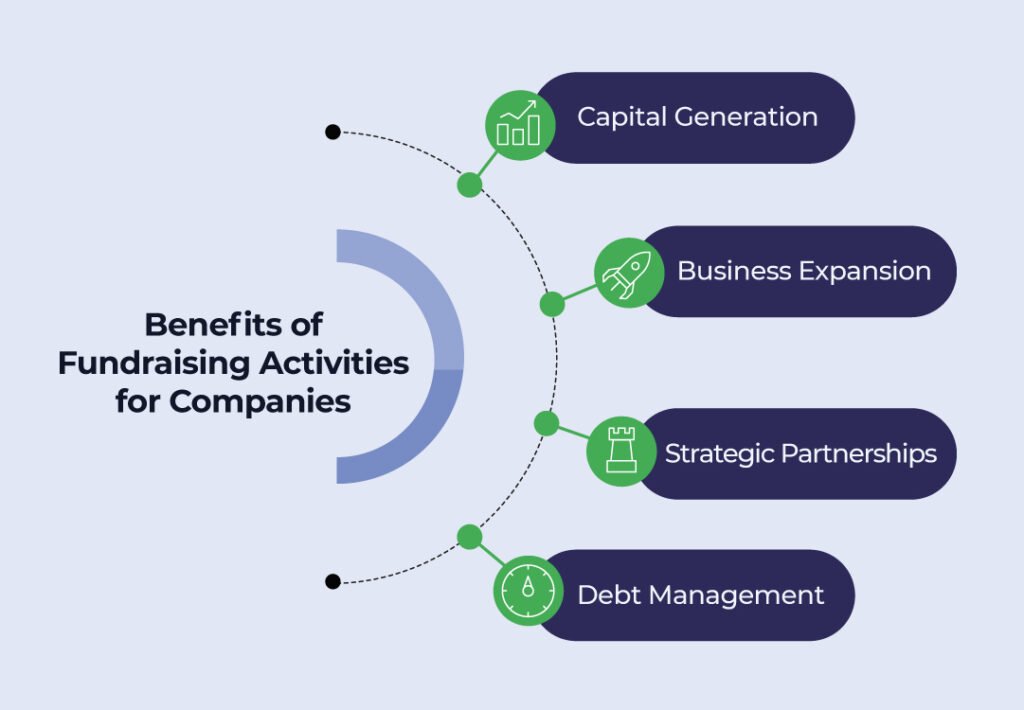Unlocking Opportunities with Investment Banking in 2023
Investment banking serves as a crucial link between companies in need of capital and investors looking for profitable opportunities. Fundraising, a core function of investment banking, plays a pivotal role in enabling companies to secure the necessary funds for their strategic initiatives. By leveraging the expertise and extensive networks of investment bankers, businesses can unlock a wide range of opportunities for growth, innovation, and market expansion.
What is Investment Banking?
Investment banking refers to financial intermediary services provided by specialized banks or financial institutions. These institutions assist businesses and governments in raising capital by underwriting or acting as agents in the issuance of securities. Investment bankers offer valuable advice, facilitate mergers and acquisitions, and provide a wide array of financial services to clients. Now that you know the meaning of investment banking, let’s find out about the importance of it.
The Importance of Fundraising in Investment Banking
Types of Fundraising Activities in Investment Banking
Initial Public Offerings (IPOs)
One of the most well-known fundraising methods is an IPO, which involves offering shares of a private company to the public for the first time. By going public, companies can raise significant capital, enhance their brand visibility, and potentially unlock opportunities for future funding.
Private Placements
Private placements involve selling securities to a select group of institutional investors, such as private equity firms or accredited individuals. This type of fundraising is typically faster and less costly than an IPO and offers companies more control over the process.
Debt Issuance
Companies can raise capital by issuing various forms of debt, such as corporate bonds or debentures. Debt issuances enable businesses to secure funding while providing investors with regular interest payments.
Rights Offerings
Rights offerings allow existing shareholders to purchase additional shares of the company at a discounted price. This enables companies to raise funds from their current shareholder base and gives them the opportunity to participate in the company’s growth and success.
Convertible Securities
Convertible securities, such as convertible bonds or preferred stock, offer investors the option to convert their securities into common shares of the company at a later date. This type of fundraising provides flexibility for investors while giving companies access to additional capital.
Mergers and Acquisitions (M&A)
Investment banking also plays a critical role in facilitating mergers and acquisitions, which involve the consolidation of companies through various financial transactions. M&A activities can provide companies with the opportunity to access new markets, diversify their product offerings, and achieve economies of scale.
Benefits of Fundraising Activities for Companies
Fundraising activities through investment banking offer numerous benefits for companies looking to fuel their growth and achieve their strategic objectives. Some of these benefits include:

Capital Generation
By engaging in fundraising activities, companies can generate the necessary capital to fund their expansion plans, research and development efforts, and other strategic initiatives. This influx of capital can provide a competitive edge and help companies seize new opportunities in the market.
Business Expansion
Fundraising enables companies to expand their operations, enter new markets, or develop new product lines. With access to additional funds, businesses can invest in infrastructure, technology, and human resources, allowing them to scale their operations and reach a wider customer base.
Strategic Partnerships
Through fundraising activities, companies can attract strategic investors who bring not only capital but also industry expertise and valuable connections. These partnerships can open doors to new markets, collaborations, and synergistic opportunities, strengthening the company’s position in the industry.
Debt Management
Fundraising activities can also help companies optimize their debt structure by refinancing existing debt or obtaining more favorable financing terms. This allows businesses to manage their debt obligations more efficiently and reduce their overall cost of capital.
The Role of Investment Bankers in Fundraising
Investment bankers play a crucial role in guiding companies through the fundraising process. Their expertise, industry knowledge, and extensive networks contribute to the success of fundraising activities. Some key responsibilities of investment bankers include:
Identifying Funding Needs
Investment bankers work closely with companies to assess their funding requirements and determine the most suitable fundraising options. They analyze the company’s financial position, growth prospects, and market conditions to recommend the best course of action.
Structuring the Fundraising Process
Investment bankers assist in structuring the fundraising process, including determining the optimal offering price, the size of the offering, and the allocation of shares. They ensure compliance with regulatory requirements and coordinate with legal and accounting teams to prepare the necessary documentation.
Investor Relations
Investment bankers act as intermediaries between companies and potential investors. They promote the company’s investment thesis, conduct roadshows and presentations, and engage in negotiations to attract investors and secure funding at favorable terms.
At Easy Capraise, we understand the importance of effective fundraising and investor relations. We specialize in helping businesses connect with investors and cultivate strong relationships. Whether you’re looking to raise capital or establish lasting connections with investors, our team is here to guide you. Contact us today to discover how Easy Capraise can support your fundraising journey and help you build fruitful relationships with investors.
Due Diligence
Investment bankers conduct thorough due diligence on companies seeking funding. They assess the company’s financial statements, business operations, market positioning, and growth potential to provide investors with a comprehensive understanding of the investment opportunity.
Challenges in Investment Banking Fundraising
While fundraising activities present significant opportunities, they also come with challenges that companies and investment bankers must navigate. Some common challenges include:
Market Volatility
The financial markets can be volatile, with fluctuating investor sentiment and economic conditions. Companies and investment bankers must carefully time their fundraising activities to maximize the chances of success and mitigate the impact of market volatility.
Investor Sentiment
The willingness of investors to participate in fundraising activities can be influenced by market trends, economic conditions, and investor sentiment. Companies and investment bankers need to assess market dynamics and tailor their fundraising strategies to attract and retain investor interest.
Trends in Investment Banking Fundraising
The field of investment banking fundraising is constantly evolving, driven by market trends and emerging opportunities. Some notable trends include:
Technology Disruption
Advancements in technology have revolutionized the fundraising landscape. Crowdfunding platforms, digital securities offerings, and blockchain-based fundraising methods have emerged as alternative avenues for companies to raise capital. Investment bankers need to stay abreast of these technological advancements to provide innovative fundraising solutions to their clients.
Sustainable Finance
Environmental, social, and governance (ESG) considerations have gained prominence in recent years. Investors increasingly seek companies with strong sustainability practices and positive societal impact. Investment banking fundraising is adapting to this trend with the emergence of green bonds, social impact bonds, and sustainable investment funds.
Special Purpose Acquisition Companies (SPACs)
SPACs have gained significant attention as an alternative path for companies to go public. These shell companies raise capital through an initial public offering with the sole purpose of acquiring an existing private company. SPACs offer companies a faster and more streamlined process for accessing public markets.
FAQs
What is an investment banking associate?
The definition of associate investment banking is a professional who works within an investment banking firm and plays a crucial role in executing financial transactions and providing support to senior bankers.
How long does a typical fundraising process take?
The duration of a fundraising process can vary depending on factors such as the type of fundraising, market conditions, and the complexity of the transaction. While some fundraising campaigns can be completed within a few months, others may take several months or even longer.
What is the role of an investment banking analyst?
An investment banking analyst plays a crucial role in conducting financial research, analyzing market trends, building financial models, preparing pitch decks, supporting deal execution, and assisting senior bankers in various investment banking activities.
What role do underwriters play in the fundraising process?
Underwriters are investment banks or financial institutions that facilitate the issuance of securities in fundraising activities. They assess the market demand for the securities, determine the offering price, and purchase the securities from the issuing company. Underwriters provide a level of certainty and financial backing to the fundraising process.
What is the meaning of investment banking?
Investment banking refers to the financial services provided by specialized institutions that assist companies and governments in raising capital, facilitating mergers and acquisitions, and offering advisory services for various financial transactions.
What are the functions of investment banking?
Investment banking performs several key functions, including underwriting securities offerings, advising on mergers and acquisitions, providing strategic financial advice, conducting due diligence, managing IPOs, facilitating debt issuances, and assisting with corporate restructuring.
Are investment banking courses or certifications beneficial for aspiring professionals?
Yes, investment banking courses and certifications can be highly beneficial for individuals seeking to enter or advance in the field of investment banking. These programs provide in-depth knowledge of investment banking principles, financial modeling, valuation techniques, and industry-specific skills, enhancing career prospects and competitiveness in the job market.
Conclusion
Investment banking fundraising activities serve as a catalyst for companies to unlock new opportunities, fuel their growth, and achieve their strategic goals. Through various fundraising methods such as IPOs, private placements, debt issuances, and M&A transactions, companies can secure the necessary capital to expand their operations, enter new markets, and forge strategic partnerships. Investment bankers play a vital role in guiding companies through the fundraising process, leveraging their expertise and networks to optimize outcomes. Despite challenges and evolving trends, investment banking fundraising continues to be a vital driver of business success.
Contact us
Good to have you here! If you have any queries, please leave your message. Our team will reach out soon:)
.








